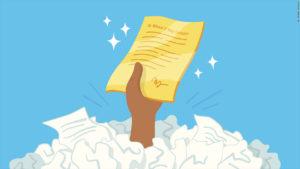 You’ve applied for the job online, you made it through the phone screening, and survived the Zoom interview. You have just left the on-site interview (yes, there might be THAT many interviews) and you wipe the sweat from your brow. All this interviewing is intense! You breathe a sigh of relief as you sit down, thinking you’ve done EVERYTHING they’ve asked for, now it’s simply time to wait for the hiring managers to make their decision, right? WRONG!
You’ve applied for the job online, you made it through the phone screening, and survived the Zoom interview. You have just left the on-site interview (yes, there might be THAT many interviews) and you wipe the sweat from your brow. All this interviewing is intense! You breathe a sigh of relief as you sit down, thinking you’ve done EVERYTHING they’ve asked for, now it’s simply time to wait for the hiring managers to make their decision, right? WRONG!
The art of sending a thank you note is dying, which I absolutely do not understand. Employers, recruiters, hiring managers, literally anyone that does interviewing and hiring for a living, state that the thank you note makes a huge difference when considering the final candidate for their openings. So why do so few people write them?! It blows my mind to know that less than a quarter of applicants take less than a minute to send a thank you email, KNOWING that is so helpful for you as an applicant in your job search. Based on my experience, I would say less than 10% of applicants send the thank you letter/note/email. Don’t be in 90%! Here are some reasons why you should always send thank you notes, how to draft them, and when to send them.
It’s Professional & Polite
The most obvious reason to send a thank you note to someone who just took time out of their day to interview you? It’s the right thing to do. It’s professional, its courteous, and it provides a great reflection of who you are as an individual. In 2022, recruiters, talent acquisition professionals, hiring managers, and anyone in HR are BUSY. If you took a look at my list of interesting statistics for the job seeker, you know that one vacancy can have up to 300 applicants. So, if you have just three openings in your company, there is a possibility that there were over 1,000 applications to sort through, and that’s on top of all the other responsibilities that individual has to complete. The fact that they reviewed your resume, believed you had the qualifications to be considered for the job, called you and scheduled an interview, and then completed the interview with you took TIME. I’m sure you feel that your time is precious, well, so is an employer’s. Thank them for their time. It will mean something to them. They will appreciate it and remember it.
No one’s doing it
The second reason you should send a thank you? I just told you that hardly any applicants do it. So, you should! With 300 potential competitors for this job, be that candidate that stands out and does what no one else does. Employers want to know that you want this job. They aren’t impressed by candidates that are randomly clicking apply without having much interest in the position. You want to stand out and be remembered, in a good way. I once met with an employer who shared with me on more than one occasion, the thank you letter was the factor that contributed to her hiring decision. She shared with me that at times, she would have two equally qualified candidates, both in experience and in their presentation skills. One would send a thank you email, one would not. Her choice went to the candidate that sent the thank you.
Add something you forgot
Your thank you letter is the perfect place to add anything that you forgot to mention. It’s very normal in an interview to be nervous and forget something that may have been worth mentioning. For example, maybe you recently completed a certificate program online, or attended a workshop. Maybe you took on a project in your current position that would translate well to this new role. It’s also an opportunity to clarify any areas during the interview that perhaps didn’t go as smoothly as you would have liked. For example, maybe you referenced something in the interview that is not on your resume. You could use the thank you as an opportunity to give a brief statement as to why.
Keep it simple
You don’t need to mail an elaborate greeting card. It’s 2022. A thank you email is absolutely appropriate (and preferred). While most of us still love getting greeting cards in the mail, for this, a simple email will suffice. You may want to try something like this:
“Dear Ms. Smith,
Thank you for taking the time to speak with me today regarding the Administrative Assistant position that is currently available with ABC Company. I enjoyed learning more about the history of the organization as well as the goals for 2022. After speaking with your team, I feel that my experience and skillset will help the company get where it’s looking to be in 2022! I would be happy to provide you with any additional information, should you need it. Again, thank you for your time and I look forward to hearing from you. Have a wonderful day!
Sincerely,
Kate Proctor
That’s it! It doesn’t need to be any more complicated than that. You don’t want to use a template and copy paste. You DO want to include parts of the interview that you found helpful or reference a part of the conversation that you enjoyed. Do you like it when someone thanks you? Keep that hat on and write as though you are the hiring manager receiving the thank you note. Many students have found this approach helpful in the past.
Side note: Make sure you are spelling the person’s name correctly and using the right email address (use professional greetings such as Ms., Mr., Dr., etc.). If you interviewed with a panel and don’t have everyone’s email address, simply ask the reader to please pass along the thanks to the other members of the search committee.
Who to send it to and when
The hiring process is different for every company. Some places may just schedule a Zoom or a face to face interview. Some may conduct a phone screening first. Some may have a second or even third interview, depending on the level of the role you are interviewing for. My advice: Send a thank you to anyone that conducts these types of interview with you. It doesn’t matter if it’s only a phone screen, send a thank you. If it’s a Zoom or in person first round interview, send the thank you. It doesn’t really matter what type of interview it is, it matters that someone is taking time out of their day to speak with you, and that deserves recognition in the form of a thank you.
It also doesn’t matter who is doing the interview. You don’t only send a thank you to the Executive Director, or your direct supervisor. You send it to anyone that conducts your interview. Again, you want to be professional and courteous. If the HR Specialist conducts your phone screen and you send him/her a thank you, they will appreciate it and pass along your kind gesture to the next level up. It will make a positive difference in your job search/interview process.
Many years ago, thank you letters were sent in the mail, so it was imperative that you got them out right away, as it would take a day or two to reach the person. In 2022, we are using email for this. You don’t want to send the thank you as soon as you finish the interview. It will reach the employer instantly. You don’t want to seem desperate.
If you are interviewing first thing in the morning (think between 9am and 12pm), it would be appropriate to send the thank you email in the late afternoon (think between 3pm and 5pm). If you are interviewing in the afternoon, my suggestion is to send the email the first thing the following morning. Be strategic about when you send the thank you emails so that your name is front and center and your email serves as a reminder of how great of candidate you really are. I would not take more than 24 hours to send the thank you.
It’s not a guarantee
While sending the thank you is the right thing to do, it doesn’t guarantee that you will be selected for the next round of interviews or for the position. What it DOES do, is guarantee that you have left a positive impression on the employer. Quick side story:
When I completed my undergraduate degree in psychology, I was working retail and so excited to be offered my first “big girl” job at an insurance company as a Customer Service Representative. I couldn’t believe that I had a 9 to 5 and that I didn’t have to work weekends. Ever again. I made it through 12 weeks of training and when I started going live on the phones, I wanted to cry. It was the worst job for me. I was tied to my desk, monitored constantly, and the rules of the insurance program I was assisting callers with changed on a daily basis. I applied for a job with a local private college in the area as a Learning Center Assistant. I interviewed, sent the thank you, didn’t get the job. That same college had an opening a few weeks later for an Evening Academic Advisor. I interviewed, sent the thank you, didn’t get the job. BUT! They liked me so much and they knew another opening was coming in Career Services as a Career Services Advisor, so my resume was passed along to the woman who was the Director at the time. I interviewed three times for that position (yes, three) and was offered the role. It felt so good and rewarding. I stayed with that college for 11 years and when I left, I was the Director of Career Services and I was very well respected. My point? You don’t know if you don’t try. You don’t know how your behavior can effect you in the future. Do the right thing regardless, even if you don’t feel the rewards right away. A woman I worked with for those 11 years who was on my interview panel told me that if someone looked up the definition of persistence in the dictionary, my picture would be there. Her comment has stayed with me all these years and has taught me to never give up on something that you really want.
Be kind
At the end of the day, the thank you note/letter/email is all about kindness. I think in today’s world, there is so much emphasis on taking care of ourselves and putting our needs before the needs of others and self-care (don’t get me wrong, all of those things are important), that we are forgetting how to be kind for one another and how our behavior affects others. We can’t get through life alone. We all need support, guidance, and assistance at some point. Being kind, polite, and professional towards others is an easy thing to do and costs nothing! Demonstrating this type of behavior will help you on your way to a successful and rewarding career.




